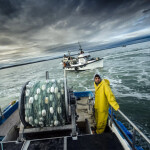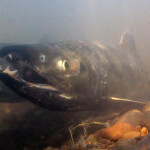Calysta has gained “generally recognized as safe” (GRAS) status from the U.S. Food and Drug Administration (FDA), allowing use of its FeedKind fermented protein in salmonid feed.
Menlo Park, California, U.S.A.-based Calysta’s FeedKind product is a protein replacement the company has been developing for several years that is made through a non-GMO fermentation process. The product is created using a gas fermentation process involving naturally occurring bacteria.
The FDA Center for Veterinary Medicine granted FeedKind protein GRAS status for use in U.S. salmonid feeds at up to 18 percent of the salmon’s die, according to Calysta. The protein alternative will be listed under its common name: “dried fermentation biomass.”
The company has performed a number of studies and trials that it said have proven the viability of the product as a substitute for fishmeal in aquaculture feed, and now with FDA approval the company can provide its product to aquaculture operations in the U.S. market.
“With so many exciting developments in US aquaculture, we are thrilled to be able to access this market,” Calysta Vice President and Aquaculture Lead Allan Leblanc said in a release. “FeedKind protein is a perfect fit for the trout industry and the burgeoning recirculating aquaculture systems (RAS) industry for Atlantic salmon.”
Achieving GRAS status, Calysta Vice President of Commercial Development Herman Sloot said, was a “key achievement” for the company as it continues to develop its product. Calysta has already made inroads in China, where its Chongqing City, China-based facility – built through a joint venture between Calysta and animal feed additives firm Adisseo that the two have dubbed Calysseo – is already operational and producing 20,000 metric tons of FeedKind aquafeed annually.
“This brings the U.S. closer in line with existing approvals in other markets throughout the world, such as the E.U., and enables us to expand the market opportunity for this revolutionary product,” Sloot said. “This is an important first step in our path toward U.S. GRAS status for use in pet foods to complement our existing E.U. and U.K. approvals for pet food.”
The company said the product will help address the growing need for aquaculture feed in the U.S. while “preserving biodiversity” by reducing the need for fishmeal and fish oil – products sourced from wild-caught species.
“GRAS status also means the world has an effective and nutritious option added to its toolbox as it comes to grips with the need to produce more food while protecting biodiversity for current and future generations,” Sloot said. “FeedKind has a far lower carbon footprint than conventional sources of animal protein and can help pet food and animal feed producers achieve their carbon reduction targets.”
Calysta added that it plans to continue to expand in Asia through its joint venture Calysseo, and its current intention is to expand production in Saudi Arabia.
Photo courtesy of Calysta







